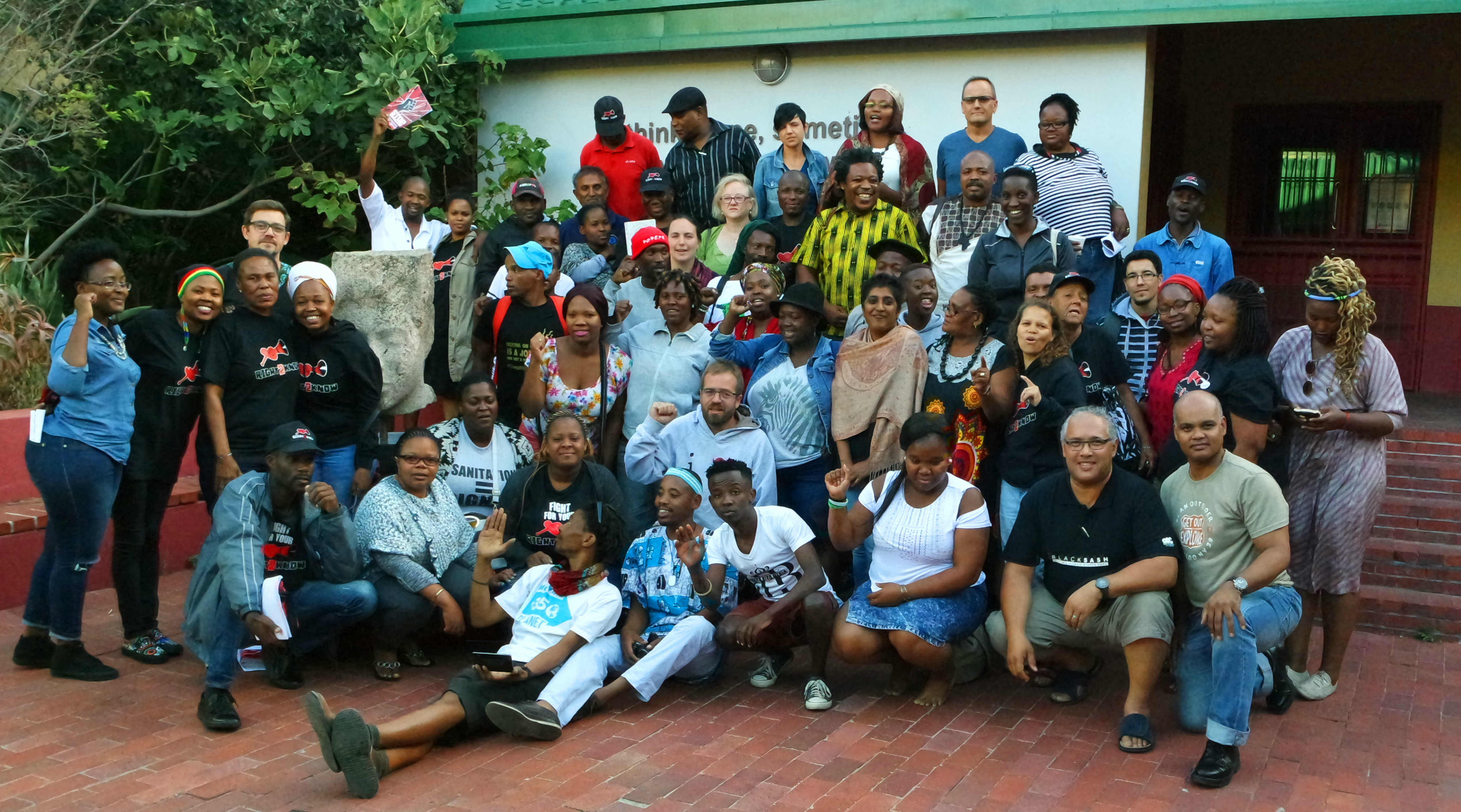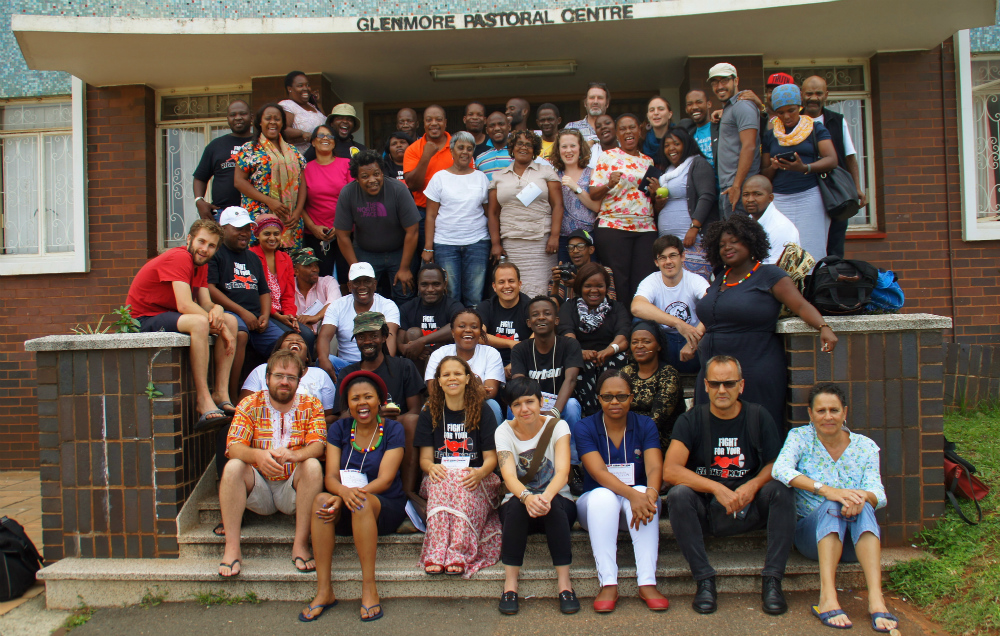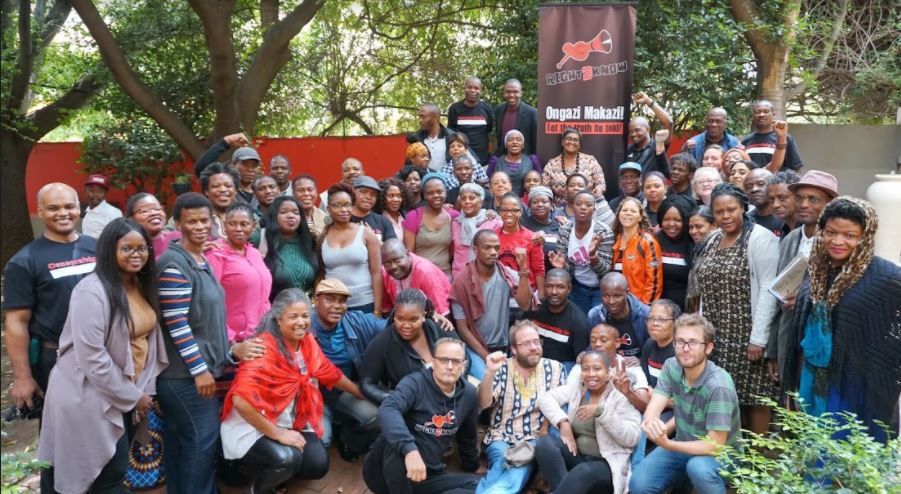Right2Know 2019 National Summit Resolutions
The Righ2Know Campaign held our 9th National Summit at the Bertha Activist Retreat in Boschendal from 9 – 11 March 2019 (see FULL REPORT).
Delegates considered the 2018 Organisational Reports and the outcome of the 2018 Strategic Review. Delegates accepted the 2019 Audited Financial Statements and 2019 Budget and assessed the progress made since the 8th National Summit in March 2018 as well as the challenges and opportunities facing the campaign in the coming year.
9TH NATIONAL SUMMIT RESOLUTIONS
We gather in a time of a deepening global economic social and ecological crisis. We live in growing poverty, inequality, social and political instability and conflict while the Ramaphosa regime’s ‘dark dawn’ remains faithful to the commitment to an elite neo-liberal and unsustainable path.
The soil is fertile for the continued growth of populist authoritarianism and securitisation/repression. To realise our vision of a free, just and democratic society we will increasingly need to confront corporate power directly as well as the state.
We will be required to work in an increasingly difficult terrain. Sustained local organising is very difficult, the risks of division and co-option are high and broad coalitions and popular campaigns will be harder to sustain.
We adopt the following resolutions to guide our renewed commitment to building the Right2Know Campaign as a democratic activist driven voice rooted in communities of the poor majority and able to deepen and advance a participatory democracy that puts people first.
RESOLUTIONS ON STRATEGY
On the character of Right2Know:
- We seek critically to challenge the status quo to be a catalyst that builds broad inclusive popular campaigns to realise a participatory democracy in which citizens are active and engaged in shaping their own lives.
- We are a coalition of organisations and individuals that defends and opens democratic space for communities and organisations to take up their own struggles – like an train track enabling trains to reach their destination;
- In the public interest we strive to shine a light on secrecy, resist repression, and promote freedom of expression for all.
- We will boldly and directly challenge unjust corporate, state, and all other undemocratic power;
- We remain strongly committed to being political in our activism without actively supporting or advocating for specific political parties.
- We recommit to ‘walk the talk’ – to strengthen the internal democratic practices that enable activist control and challenges authoritarian and patriarchal impulses within the Campaign. We will also promote democratic practice in the activist structures with whom we collaborate and with which we engage progressively.
- We recognise our limitations and we strive to be realistic to do what we can within our current capacity paying attention to organising and popular education to ensure the sustainability of our mobilization.
On the structure of Right2Know:
- Recognising the growth of the Campaign over the past eight years and recognising the challenges of the shifting socio-economic and political context, the R2K acknowledges the need to adapt its structure(s) to respond more effectively to the more focused advocacy approach and the shifting needs within the R2K and in communities.
- We resolve to place strategic and effective action at the heart of our activism and to ensure that the Programme of Action along with the budgetary process with provincial oversight structures within all national and local structures is activist-led.
- Recognising the challenges of ensuring proper administrative and financial management, we resolve to support these functions with dedicated and properly capacitated staff.
- Recognising our adoption of 3 broad campaigning areas detailed below, we recognise that our structures must be aligned to best supporting those areas at a provincial or local level and that those broad campaigning areas must be joined-up between regions and nationally. At the provincial level this will consist of an activist-led programme oversight structure (the Provincial Working Group) that will meet periodically as well as at least 3 campaigning focused action groups that will meet and work as required to achieve our resolutions. We endorse the approach of joining and connecting local actions into a national approach.
- Recognising that the practical implementation and details of the new structure will need further engagement and work, we resolve to mandate the incoming NWG to establish as a matter of urgency, a sub-committee to work out the details in consultation with all affected structures.
RESOLUTIONS ON CAMPAIGNING
Right to Communicate
- We will continue to make strategic interventions to respond to threats and take opportunities to defend and advance freedom of expression and the right to communicate – including free and diverse media and access to telecommunications.
- We will focus on building the campaign for a free, fast, secure and easily accessible Internet – a public good that serves the information and expression needs of all people;
- Challenge the telecom monopoly profiteering and break their domination of spectrum.
- Campaign for WiFi in communities and public spaces and institutions that is provided as a free basic service.
- Campaign for a safe and secure internet free of censorship and surveillance where our privacy and personal information is protected, including challenging the profiteering of multinational corporations like Facebook, Amazon and Google (#HandsOffMyNet). We will demand that the state place a tax on online earnings by multi-national online corporations.
- We will drive the Love Your Community Radio campaign mobilizing progressive civil society to engage their community media using popular education and workshops until the MTR.
Right to Protest
Recognising the growth over the past 3 years of this area of our work, and recognising the increasing challenges to the right to protest, the R2K commits to deepening its current work in the following ways:
- We will continue to research municipal by-laws and demand the scrapping of unjust by-laws that are not in line with the RGA.
- We will continue to identify unjust sections of the RGA and other laws that infringe on the right to protest and campaign to scrap them.
- We will demand a standardised notification form across all municipalities that speaks to the RGA.
- We will campaign to hold private security accountable in protest, specifically engaging the private security regulator (PSiRA).
- We will build on the victories of the SJC10 case and high court rulings on the RGA
- We will strengthen our relationships and partnerships with other organisations working on the right to protest, including strengthening our involvement in the R2P Project towards ensuring representation for criminalisation of protesters
- Conducting specific further research to expand the right to protest and against the increasing surveillance of activists and protesters;
- Actively campaigning against the ongoing criminalisation, intimidation and surveillance of protesters; and
- Expanding our popular education work on the right to protest, including to rural communities.
Participatory Democracy
An active and engaged citizenry is key to moving beyond a representative system of government to a properly participatory democracy. This means that communities and people participate fully in the decisions that affect their lives in a collective and meaningful way. We strive to support communities, activists and allied organisations to get an equal space at the table and have our inputs considered, as well as the necessary information, tools and the skills to be able to take full part in the process. Participatory democracy also means working to strengthen the relevant structures and institutions to promote meaningful engagement.
We therefore resolve:
- To expand our toolkit of tools and skills training and popular education materials to better support activists and communities to access information, engage stakeholders and pursue their demands for a better quality of life;
- To promote both access to information as well as the creation of own information through social audits and community mapping for example.
- To continue to advocate, alone and in collaboration with other organisations and structures, for a more robust policy and legal framework to promote access to information, administrative justice and meaningful engagement;
- To continue to open up and occupy spaces at National, Provincial and Local government levels. In particular we will expand our involvement in the ParliWatch collaboration to provincial legislatures. We will seek to establish and strengthen our relationships with stakeholders with an eye to opening up new spaces for engagement.
- To build on our success in opening up the Executive appointment processes and in partnership with other organisations developing a framework to ensure those appointments respect and comply with the Constitutional principles of openness and transparency
- To push for the creation of a Public Participation Charter that addresses the legitimate participation needs of communities.
- To monitor the integrity of the National & Provincial Elections 2019, especially the issues of hate speech, electioneering, compliance with the Electoral Code of Conduct and the readiness and conduct of the IEC;
- To prepare for the LGE2021 by revisiting our campaign on the Right to Recall and looking at the implementation of the Party Funding Act.
RESOLUTIONS ON MOVEMENT BUILDING
Solidarity with local struggles
- We resolve to create a database of community organisations and the creation of a skills category database.
- We resolve to explore the opportunity of the need for an emergency budget for local struggles.
- We resolve that all community work must impact the broader local community and not individuals in order to prevent gate-keeping.
- The incoming NWG must develop criteria to guide our work in engaging in local struggles to be tabled at the next MTR
Moving beyond GP, KZN, WC
- We continue with a model of a struggle before structures.
- All active community and movements that have worked with R2K and shown capacity to champion struggles should be included in the national action groups.
- We must build on existing solidarity network(s) to strengthen outreach work
- We will continue to support existing struggles on outreach communities within the parameters of our programme and focus. The incoming NWG will specifically identify these struggles.
- We will continue to provide popular education in active communities
- We will monitor implementation, follow up and evaluate the outreach work and link it with the R2K programs
Popular Education
- We reaffirm that we will use a variety of popular education methods including:
- Working with community media
- Public meetings
- Forming popular education task teams before key/core events (include leaders from targeted communities)
- Using social media, traditional media, roadshows, sloganeering and other artistic expressions of popular education
- We will work with available structures and organisations.
- We acknowledge that language is a core part of education and will ensure that our language is accessible
- We will be responsive to the language needs both in translations of materials and meetings
- We must ensure that our popular education and mobilisation tools work together.
- We must identify progressive tertiary institutions that we can work with to strengthen research capacity.
Combating Patriarchy
- That we need to design and adopt a Gender Policy Framework that will address broader issues, including Gender Based Violence, bullying, harassment, sexual harassment and equal opportunities. Explore possible staffing to implement this work.
- The current Sexual Harassment Policy to be and reviewed and tightened.
- That Employment Equity needs to be upheld especially when it comes to employing people in strategic positions, but not limited to these positions
- All employee benefits need to be reviewed and aligned to gender equity and feminist goals. Employee benefits including paid parental leave policy of staff members to be reviewed, and a percentage need to be attached to it
- By the next MTR, the incoming NWG to consider having at least 50% representation of womxn on all leadership levels
- Targeted capacity building to enhance womxn’s knowledge to effectively lead their local struggles and enable the leveling playing fields with men
Leadership Development
- We will support activists to identify opportunities for skills and leadership development in partner organisations/institutions and progressive tertiary institutions.
- We will practice a principle of leadership exchange (we learn as we lead and we lead as we learn)
- We will promote values of humility, respect and groundedness in leadership.
- We will strive to be attentive and responsive leaders.
- We will provide compulsory training on governance, strategic leadership and fiduciary responsibility for NWG members within three months of election.
Internal Communication & Accountability
- Monthly narrative and financial reports submitted to the NWG as well as NWG minutes must be shared electronically with other structures who may choose to consider reports and give the NWG feedback.
- The NWG will remain responsible for all policy and the national budget – when policies and/or budgets impact on any structure these structures must be consulted.
- To ensure transparency and enable synergies and connections structures must share minutes of their meetings – including any POA – within 3 working days of a meeting with other structures.
- If an elected NWG does not collectively have adequate experience and skills to govern an organisation of R2K’s nature after skills training, they must co-opt comrades to full the identified gaps.
- We will develop a policy outlining criteria for participation in R2K structures in consultation with these structures.
- We should assess whether the flat structure has served the effective functioning of the NWG. Once this is done, an informed decision on whether or not to adopt the formal division of labour on the NWG can be taken.
- Once the questions on the new campaign structure are resolved (see above), the accountability mechanisms must be reviewed.
Staffing & Finance
- Recognising the resolutions to better structure and focus our activism and recognising the proposal to restructure staffing to better support the new Activism structures, we resolve that the incoming NWG establish a sub-committee to formulate a proposal on an integrated Advocacy Team and an integrated Admin/Finance Team within a period of three (3) months after the Summit;
- Recognising that currently there are several vacancies in the staffing complement throughout the organisation, we resolve that the incoming NWG come up with a proposal on the filling of those vacancies within 3 months of taking office. The NWG should fill the vacant posts as soon as possible in line with this proposal.
- We confirm the resolution that Provincial Coordinators will continue to be an important component of the provincial / local structures. Their primary responsibility will be to coordinate and drive the provincial / local programme(s) of action. We confirm that the administration and finance functions will be performed by dedicated and properly capacitated staff.
- We resolve that a Solidarity Fund be established within the next three months on the following terms:
-
- Contributions to the fund be on a voluntary basis by any staff or activist members on a regular or monthly basis;
- That the contributions be paid into a separate bank account established solely for this purpose;
- The account will be administered centrally by the FinTeam with regular reporting and accountability to the NWG;
- The procedures for application, criteria for eligibility and other practical arrangements to be finalised by FinTeam within 3 months of the National Summit
-
- Recognising the recent appointment of the Deputy National Coordinator and the Finance Coordinator, we resolve that the National Administrator and Finance Coordinator visit each province to set up and explain the revamped financial systems within the first six months after the summit; further we resolve that the Deputy National Coordinator engage all advocacy staff and provincial / local activists about the integrated advocacy approach.
- Recognising that the R2K is currently reviewing the salary scales, we resolve that the incoming NWG finalise the salary scales as soon as possible.
- The incoming NWG should develop an IT policy for the campaign including a sound IT system
- The incoming NWG should review the Safety Net policy
CONSTITUTIONAL AMENDMENTS
The Summit resolved to amend the Right2Know Constitution to extend the term of the National Working Group from one to two years by making two amendments:
- In 6.1 replace “from year to year” with “every second year”.
- In 10.3.4 replace “the election of persons who shall serve on the National Working Group for the ensuing year” with “every second year, the election of persons who shall serve on the National Working Group for the ensuing two years”.
The amended Constitution is online here.




